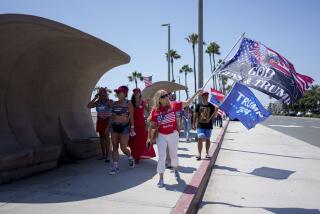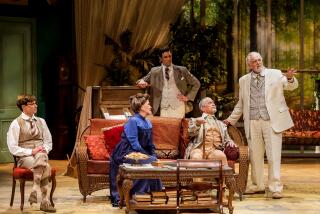Staging our political reality
So here I am, deep in Oregon’s Willamette forest, darkness falling, the rain getting heavier, my unsuitable shoes leaking copiously and the map provided by Cascadia Forest Defenders turning to papier-mache in my hands. I am searching for a group of tree-sitters reputedly guarded by a razor-wire barricade hung with totemistic emblems and, as I stumble farther and farther into the sodden gloom, I am reduced to shouting pathetically, “Is there anybody there?” Answer comes there none, and as I squelch back toward the road, I’m faced with the bigger question: What the hell am I doing here?
The answer, obviously, is that I am a British playwright researching a two-play cycle set on either side of a governor’s race in a fictional West Coast American state. At this point, I am at the beginning of a fall 2001 research tour that will take me from Eugene, Ore., to San Clemente, Calif., talking to political consultants, pollsters, journalists, academics, community activists, former congressmen, failed senatorial (and mayoral) candidates, state Assembly members, a former White House chief of staff and indeed two Humboldt County tree-sitters called Remedy and Wren whom I talk to (sensibly) not by shouting up at them but by calling them on their mobile phones.
Only one of these generous people asks me why a British playwright is writing about the American political scene. My sound bite answer is that I am not the first European to come to the West Coast and make a drama about America -- without wave upon wave of them, the story of American film would be very different. And if Tony Kushner can set the first act of “Homebody/Kabul” in London and the second act in Afghanistan, then I can write about America as if I was an American.
Or so I thought. In fact, I think I failed -- not because the plays are under-researched, I hope, but because they inevitably emphasize things that appear completely ordinary to natives but seem odd or exceptional to me. The great modernist project is “making strange” -- as the Russian structuralist critic Viktor Shklovsky put it, art is there “to make the stone stony.” After watching them in performance for a year, my plays seem more clearly an outsider’s response.
So, journeying down the I-5, I respond with a newcomer’s relish to the vigor and directness of American political speech, as courtly consultants describe how they plan to broil, cook, cream, fry, toast or shish kebab their electoral opponents (often by way of jerking their chain, cleaning their clock, biting them in the shorts. Surely no native writer would fully share my delight in strategists’ plans to detach the lawn-sprinkler vote from coastal feminazis (if not entice the bunny-huggers and the Quiche Corps into bed with the First Church of the Sunday Brunch). But more profoundly, I find myself increasingly wedded to a mission -- to bust the myth that American politics is entirely a present-tense affair, that Americans have no sense of political history.
Superficially, you can see why people believe this, particularly on the West Coast, where politics (like economics) is individual and entrepreneurial, much more about the voter as consumer and much less about those institutions (labor unions and indeed political parties) that pass on loyalties between the generations. Here, a political campaign really is three people sitting, watching 30-second spots on a TV screen, and a candidate a person who makes calls to raise the cash to pay for them.
The West Coast is also further along the road toward the professionalization of politics, a place where activities from distributing lawn signs to manning phone banks to getting out the vote are undertaken not by volunteers but by commercial companies set up for the purpose.
And yet, almost every consultant I spoke to went misty-eyed over a great inspiring campaign of their youth -- for Democrats back to McGovern, for Republicans, to Goldwater. All acknowledged wryly that what they actually did then was something you’d have to pay people to do now. I knew that politics had become more immediate for its consumers, more like the other products sold by 30-second television spots; I hadn’t realized how alienated the activity had become from the people who traditionally undertake it.
I also realized that all this had an unintended consequence. An early interview was with a retired female teacher who had volunteered for the Democrats all her life but had now transferred those skills to campaigning against guns. Political activists still train one another in basic electoral skills, not for party work but for proposition and measure campaigns (as a consultant put it, the great thing about doing propositions is: no candidate).
In the forest, I realized that environmentalists develop their own skills -- physical ones to do with getting up and living in trees, presentational skills to promote their campaigns. And both tree-sitters and their opponents in the logging industry develop narratives about the forest -- as a Humboldt County Assembly member proverbially put it: “My voters all love trees; it’s just that some love them vertical and others love them horizontal.”
Finally, I noted something that really is specific to this country and, in this country, to this coast. In Britain, although conservatives are hostile to various forms of governmental activity, if you’re on the right, you support the national state and its institutions. Here, of course, there is a division that crosses the Conventional Divide between outsiders and insiders, which pits conservatives against the very fact of a federal government, and allows America to provide a home to a more or less extinct European species, the right-wing libertarian.
And the activity in which the outsiderdom of the far right meets the outsiderdom of the far left most obviously is in the construction of utopias. From the hippies of Haight-Ashbury to small creationist Southland communities, from the Berkeley Liberation movement to survivalist militias, from logger villages built on timber money to tree-sit villages 200 feet up in the air, you can detect a surprisingly shared vision of the good community, often seceded from the federal government, certainly freed from the fetters of the state.
And here’s where history comes in. It isn’t just that postwar American politics clearly operates on cycles of betrayal and revenge -- the ‘60s left avenging McCarthyism, the Clinton impeachment answering Watergate, the Iraq war seeking to conclude the agenda of the Gulf War. It’s that the West Coast has been one of the major sites of contest between the two great transformative myths of the 20th century.
Community redefined
Of all the places on the planet, California is where you can fulfill the American Dream of upping stakes, boarding the boat, traversing the prairies, changing your religion, language and even name and building a new life by your own efforts and on your own terms. But California is also a crucible of experiment in collective ways of being. From the Black Panthers and rural hippies back to the Wobblies, from the gay community in Castro Street and the eco-warriors of Humboldt County back to the Utopian Society, Job Harriman and Upton Sinclair, Californians have sought to invent new forms of community. And indeed, in their way, the kitchen-top, coffee-morning campaigners for Barry Goldwater and Proposition 13 (the forerunners of the recall campaigners of 2003) also contribute to this history of communal reinvention.
Although there are (of course) elements of the American political process about which it’s hard to feel enthusiasm, I was surprised by how much my plays turned out to be a kind of celebration of the political creativity of the western side of the Continental Divide. From the woodlands of the Pacific Northwest to the groves of Orange County, I found both an intelligence and a skepticism about the political process, which is heartening in a country facing up to the reality of a polity so starkly divided on religious, racial, geographical and gender lines.
If that’s obvious to everyone here, then at least I’ve tried to make it strange enough to notice. As strange as the Willamette forest seemed to me, as I stumbled through it on a wet fall afternoon nearly three years ago.
*
David Edgar wrote “Continental Divide.” The Birmingham, England-based playwright won the Tony Award in 1982 for “The Life and Adventures of Nicholas Nickleby.”
More to Read
The biggest entertainment stories
Get our big stories about Hollywood, film, television, music, arts, culture and more right in your inbox as soon as they publish.
You may occasionally receive promotional content from the Los Angeles Times.










